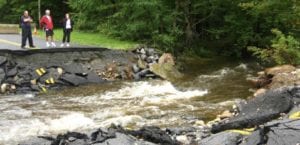Who is a member?
Our members are the local governments of Massachusetts and their elected and appointed leadership.

An undersized culvert on Benton Hill Road in Becket led to a road being washed out during Hurricane Irene in 2011. With funds from a MEMA Hazard Mitigation Grant, the crossing was replaced in 2017 to meet newer stream crossing standards. (photo from Division of Ecological Restoration Annual Report)
On Feb. 20, the Division of Ecological Restoration launched the application process for a new round of grant funding and technical assistance to support culvert and small bridge replacement.
Municipalities seeking to replace undersized, perched and/or degraded culverts located in an area of high ecological value are encouraged to apply for the grant funding. Applications are due on March 20.
The DER estimates that total funding available under the program in fiscal 2020 is $750,000.
Massachusetts has more than 30,000 culverts and small bridges that allow rivers and streams to flow beneath road crossings. Many culverts that need to be upgraded or replaced are at imminent risk of failure, which creates a threat to public safety and environmental health.
The Culvert Replacement Municipal Assistance Grant Program was launched by the DER in 2017 after a 2015 survey of municipal highway and public works directors indicated a lack of adequate resources for culvert management. In both 2017 and 2018, the DER awarded grants to 13 communities.
The DER will only consider projects intended to meet the goals of Massachusetts Stream Crossing Standards, which include improved passage for fish and wildlife and improved resilience to severe weather events.
More information about the culvert grant program, including application materials, is available at www.mass.gov/how-to/culvert-replacement-municipal-assistance-grant-program or by contacting Carrie Banks at the DER at carrie.banks@mass.gov.
Working group formed
A new working group has convened to address challenges that municipalities face with planning for, funding and completing culvert-related projects.
The working group, established by the fiscal 2019 state budget, is coordinated by the Department of Transportation and the Executive Office of Energy and Environmental Affairs. Its mandate is to “identify and evaluate the costs and benefits of existing environmental rules and regulations, engineering standards and permitting processes and their impact on the replacement or repair of deteriorated or substandard culverts and small bridges that measure less than 20 feet wide.”
The group is to present its findings and recommendations to the Legislature within five months of its first meeting, which was held in early February. The working group includes designees from the MMA and the Massachusetts Highway Association, along with representatives from several state agencies and environmental advocacy groups.
MMA members who would like to provide input on the challenges or successes they have had related to culvert management or replacement are asked to contact MMA Legislative Analyst Ariela Lovett at alovett@mma.org or 617-426-7272, ext. 161.